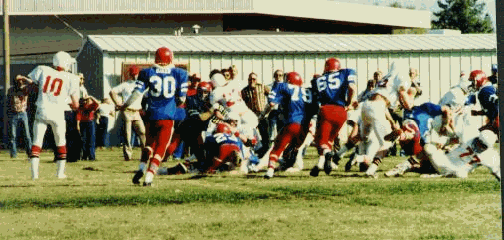|
VISION. Vision is seeing with intellect. Vision will allow you to see what is possible with the training aids, and equipment available to you.
EXPLANATION. Always give a detailed explanation, for the purpose of every training exercise you employ. If your players don't understand why they must do a particular training task, how can they learn by it. Explanation makes your training more efficient by saving time.
DRILL. Individual, and joint drill must emphasize realism, while improving the performance potential of your players.
Drill is used to improve player strength, power, quickness, understanding of action, and execution of action.
REDUNDANCY. Use more than one approach to meeting each training requirement. Though it may look like a waste of time, redundant training methods reduce player boredom, by making it unnecessary for them to repeat the, same drill over and over. Redundancy also gives the players a chance to see one item of training from different perspectives, this helps them recognize exactly what they are training for.
BREVITY. Run your drills just long enough to have a positive effect. overdoing often has a negative effect on your players, by inducing them to loaf, or just go through the motions.
DISCUSSION. Hold group discussions with your, team. encourage all the players to voice their opinions as to the worth of the training, how to make the training better, and how they feel about the overall direction of the program.
Such discussions will show your, team that you care what they think, and that you are not afraid of their criticism. As their coach you should value the team's input enough to give real consideration to their concerns.
CONTROL. Control is a necessity for keeping your training program on track. Make sure your players understand that there it no time for arguments, or negative discussion on the field, during practice, or during games.
Running an effective training program is not difficult, as long as you know what is needed use your head, be innovative, and avoid mindless routine.
Do your best to make your practice sessions challenging
but fun. Get your players involved in enforcing player, discipline, by instilling in them a sense of purpose, and an understanding that the team must be a tight unit. with common goals, and direction. Try to avoid as much as possible physical punishment of the team. too much of this type of enforcement is a waste of time, and borders on abuse. You don't want your players to hate you, or think that you are prone to venting your anger on them. If you insure your team has clear direction, and sense of purpose. The team will be self motivated, and expect good order.
If your players feel you are doing your, best for them. They will do their best for the team.
|
|

